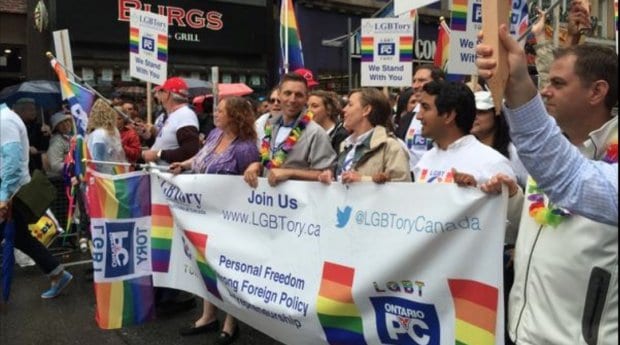A group of LGBT Conservative supporters is urging the federal party to reverse its official stance against same-sex marriage.
“We want it changed because we think it’s an infringement on our rights as Canadian citizens,” says Eric Lorenzen, an executive member of the group LGBTory. “It’s a policy that doesn’t reflect the broad opinion of conservatives in Canada.”
In a letter sent earlier this month, the group calls on Conservative interim leader Rona Ambrose to support removing two clauses in the party’s policy book.
As of its November 2013 revision, the Conservative party manifesto calls for a free vote on “the definition of marriage,” instead of letting the courts decide. Another clause states: “We support legislation defining marriage as the union of one man and one woman.”
A parliamentary vote legalized same-sex marriage across Canada in 2005, though courts in eight provinces and Yukon had validated such marriages two years prior.
In a letter sent to Ambrose on Jan 10, 2016, LGBTory points out that prominent Conservatives have supported same-sex marriage, and say it aligns with the party’s stance on personal freedoms.
“Having an official policy negating same-sex marriage in the party policy alienates people who would naturally be allies of the party,” Lorenzen argues. “We’re the last [mainstream] party in Canada to do it, so it’s time that we stepped up.”
But conservative political commentator JJ McCullough, who identifies as gay, believes the move could backfire and “inflame old divisions within the party.”
McCullough believes that though very few Conservative party members would push for same-sex marriage laws to be reversed, many will resist falling into the trope of being out-of-touch with mainstream society.
“It will be seen a sort of way to force the party to concede to a Liberal narrative, which is the idea that the Conservative party is still this sort of backwards, regressive thing that is being held captive by these sort of Christian-fundamentalist crazy people,” says McCullough.
“From a tactic perspective it just seems like the wrong fight to be picking,” he says.
Lorenzen disagrees, and says showing the public that the party supports LGBT people will tap into libertarian-minded, urban voters.
“The policy is bad for the party,” he says. “It’s healthy for the party to have this discussion.”
LGBTory, which marches in Pride parades in various cities, is planning a visual presence at the party’s May convention in Vancouver. It is also pondering whether to propose a formal motion.
A spokesman for Ambrose and the Conservatives said the party follows the will of its members.
“It’s up to our members to propose policy resolutions and we trust our members to be able to decide on those policy resolutions,” wrote Cory Hann in an email.
But for now, LGBTory is focused on running a booth and petition at the Ontario PC party’s March convention in Ottawa, to shore up support ahead of the national convention.

 Why you can trust Xtra
Why you can trust Xtra


